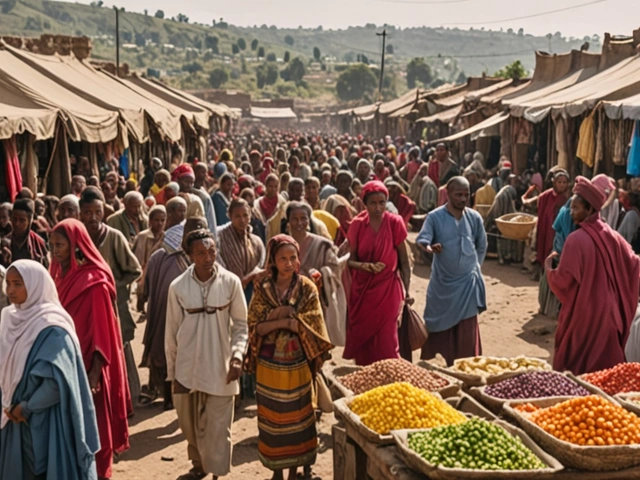With its rich history and vibrant culture, Ethiopia offers a unique view into a variety of occupations that shape the nation's economy and daily life. From the traditional agriculture that has sustained communities for generations to the burgeoning technology sectors, employment in Ethiopia is diverse and evolving. Understanding these careers not only provides insights into the country's economy but also sheds light on the societal values and advancements driving change.
- Agricultural Occupations
- Service and Retail Jobs
- Healthcare Professionals
- Emerging Technology Careers
Agricultural Occupations
Agriculture is the backbone of Ethiopia's economy, employing a staggering 80% of the population. The landscape of Ethiopia, with its fertile highlands and diverse climates, provides an ideal environment for cultivating a variety of crops. Among the most prominent are coffee, teff, and khat. Ethiopia is known as the birthplace of coffee; Ethiopian coffee is renowned for its unique flavors and has a significant presence in the global market.
Teff, a tiny grain that is the main ingredient in injera, the national dish, holds a special cultural and economic place in Ethiopian life. Teff farming relies heavily on traditional methods, but there has been a recent push toward modern farming techniques to increase yield and sustainability. The significance of teff farming extends beyond economics, as it plays a crucial role in daily Ethiopian cuisine and traditions.
Livestock farming, including cattle, sheep, and goats, is another crucial sector. It contributes substantially to the livelihood of many Ethiopian families. The country grapples with challenges such as inadequate access to veterinary services and fluctuating market prices. However, initiatives aimed at improving animal health and market stability are underway, making livestock farming more viable and rewarding for Ethiopian farmers.
"Agriculture remains the key driver of Ethiopia's economy. Ensuring sustainability and improvement in this sector is vital for the nation's growth." - Ethiopian Ministry of Agriculture
Irrigation is a critical aspect of Ethiopian agriculture, especially in the face of irregular rainfall patterns. Traditional rainfed farming is giving way to more sophisticated irrigation systems, involving both small-scale and large-scale operations. These systems help maximize yields and mitigate the impacts of climate change, enabling farmers to produce crops all year round and not be solely dependent on seasonal rains.
Challenges and Innovations
Ethiopian farmers face several challenges, including limited access to modern technology, fluctuating market prices, and the impacts of climate change. Soil degradation and pests are other significant concerns. Nevertheless, innovative approaches are being adopted to overcome these challenges. The introduction of drought-resistant crops, sustainable farming practices, and agricultural education programs are all assisting farmers to adapt and thrive.
Another notable innovation is the growth of cooperative farming. Farming cooperatives enable small-scale farmers to pool resources, share knowledge, and improve their market access. By working collectively, farmers can achieve economies of scale and significantly boost their productivity and incomes.
For a nation steeped in tradition, the inclusion of women and young people in agriculture has been pivotal. Empowering these groups through education and resources is transforming the agricultural landscape. Women are increasingly taking on leadership roles in farming communities, and young people are bringing fresh ideas and modern techniques.

Service and Retail Jobs
Service and retail jobs form a significant part of the Ethiopian economy, especially in urban centers like Addis Ababa and Dire Dawa. These jobs offer vital employment opportunities to a diverse range of people, from young adults just starting their careers to individuals looking to supplement their income. Service jobs often include roles in hospitality, such as working in hotels, restaurants, and cafes. These places not only serve locals but also cater to the increasing number of tourists visiting the country. Retail positions, on the other hand, are commonly found in marketplaces, shopping centers, and small neighborhood shops.
One interesting aspect of service jobs in Ethiopia involves the nation’s rich coffee culture. Coffee shops are ubiquitous, offering locals and visitors a taste of the nation’s famed coffee. Working as a barista or server in these establishments can be rewarding, providing both a stable income and opportunities to learn about the coffee-making process. In many traditional cafes, known as 'bunna bets,' workers also get the chance to participate in traditional coffee ceremonies, which hold significant cultural value. Retail jobs in Ethiopia often focus on selling handmade goods, such as textiles, jewelry, and crafts. The sales of these items not only support local artisans but also help preserve Ethiopia’s rich cultural heritage.
The growth of service and retail sectors has also led to new opportunities among young entrepreneurs. Many Ethiopians are leveraging modern technology to start small businesses, such as online shops or delivery services. This trend is particularly noticeable in cities where internet connectivity is higher and consumer demands are more diverse. According to a report by the Ethiopian Statistical Agency, the service sector accounted for 45% of urban employment in 2023, a reflection of its expanding influence. Successful entrepreneurs in these sectors often share their stories, inspiring others to venture into similar businesses.
Wages in the service and retail industries can vary, but these jobs often provide a dependable income that supports families and contributes to the local economy. In bustling marketplaces, traders and vendors play a vital role in the community, often forming close-knit networks that support each other. This sense of community is a strong driver for many to enter these fields. Customers also benefit, as they receive personalized service and have access to unique, locally-made products that aren't typically found in larger retail chains.
According to Mek1ya Tesfaye, a sociologist at Addis Ababa University, "The service and retail sectors are vital for increasing employment opportunities and driving local economic growth in urban areas."
One should also note how globalization has impacted the types of goods available in retail environments. With increasing access to imported items, Ethiopian consumers now have more options than ever before. However, this also means that local businesses must find ways to differentiate themselves and emphasize their unique offerings. Markets are often brimming with vibrant activity, and anyone entering this field should expect a dynamic and sometimes challenging work environment.

Healthcare Professionals
Ethiopia's healthcare sector plays a crucial role in the well-being and development of the nation. Over the years, there has been a noticeable improvement in healthcare infrastructure and availability of services. From medical doctors to nurses, and from traditional healers to modern medical researchers, the variety of healthcare professionals in Ethiopia reflects both the nation's traditional roots and its forward-looking innovations.
Healthcare in Ethiopia has seen significant support and investment from both governmental programs and international aid organizations. The government, through its Health Sector Transformation Plan (HSTP), aims to provide equitable and accessible healthcare services. This initiative addresses the challenges posed by communicable diseases, maternal and child health issues, and the growing burden of non-communicable diseases. Notably, Ethiopia has a large number of community health workers known as Health Extension Workers (HEWs). These dedicated professionals are often the first point of contact for healthcare in rural areas, delivering essential services and health education.
Medical doctors and specialists in Ethiopia are primarily situated in urban areas, working in hospitals that range from regional facilities to specialized centers like the Black Lion Hospital in Addis Ababa. Despite improvements, there's still a notable shortage of healthcare professionals relative to the population size. For instance, the doctor-to-population ratio remains lower than the World Health Organization's recommendation. However, many medical professionals are committed to bridging this gap through their tireless work and dedication.
"Healthcare workers are the backbone of our health system. Their dedication, especially in rural areas, makes a profound impact on the lives of many," noted Dr. Lia Tadesse, Ethiopia's Minister of Health.
Traditional medicine also holds an important place in Ethiopian healthcare. Herbalists, spiritual healers, and other traditional practitioners offer services that are deeply rooted in the culture. These practices are often integrated with modern medical care, providing a unique blend of traditional wisdom and contemporary science. This approach respects the cultural context while ensuring patients receive comprehensive care.
The nursing profession in Ethiopia has also grown significantly, with nursing schools and training programs becoming more widespread. Nurses in Ethiopia are not only caregivers but also educators and advocates for public health. They work in various settings, including hospitals, clinics, and community health centers. Their role is critical in providing primary care, supporting patients in chronic disease management, and improving maternal and child health outcomes.
Emerging technology is creating new opportunities in the healthcare sector. Telemedicine and mobile health applications are beginning to make waves, improving access to healthcare services in remote and underserved areas. These technological advancements offer promising solutions to some of the systemic challenges the healthcare sector faces. There's a growing interest amongst young professionals in health informatics, a field that merges healthcare with information technology, aimed at enhancing healthcare delivery and administration.
Overall, healthcare professionals in Ethiopia, embracing both tradition and innovation, contribute significantly to the societal fabric. Their dedication and resilience in providing quality care, often under challenging conditions, is commendable. As the country continues to develop, these professionals will undoubtedly play an even more crucial role in shaping a healthier future for Ethiopia.

Emerging Technology Careers
In recent years, Ethiopia has witnessed a remarkable shift in its job market with the rise of technology-based careers. These Ethiopia jobs are diversifying the economy, attracting young talent, and fostering innovation. With rapid urbanization and improved internet connectivity, the technological landscape is becoming fertile ground for new opportunities.
The software development industry, for instance, has seen substantial growth. Companies like Gebeya and Venture Capital for Africa (VC4A) are nurturing local software developers, helping them to build skills needed for both domestic and international markets. This upsurge has led to the creation of numerous startups focusing on solving local issues through technology, such as digital payment solutions and e-commerce platforms.
Additionally, the government has recognized the potential of the tech industry. Initiatives like the Ethiopian ICT Park are aimed at creating IT hubs that can support budding entrepreneurs and tech enthusiasts. With a growing number of incubation hubs and coworking spaces, young professionals are now more equipped to venture into tech entrepreneurship, contributing to the evolution of the economy. As Dr. Debretsion Gebremichael, Minister of Communications and Information Technology, once said,
"Our aim is not only to catch up with the digital world but to harness it to address our unique challenges."
Another significant development is in the realm of telecommunications. With the introduction of Ethio Telecom's 4G LTE network, the accessibility of high-speed internet has improved dramatically. This has opened doors for various sectors, including online education, telemedicine, and digital marketing, creating numerous job opportunities. Many businesses, both small and large, are now depending on digital solutions to improve efficiency and reach broader audiences.
Data science and cybersecurity are also gaining traction. Universities and technical institutes are introducing courses and programs to meet the increasing demand for skilled professionals in these fields. This academic shift is preparing the workforce for high-tech jobs that are essential in today’s digital age. The rise of these careers is signaling a transformation in how the youth perceive job opportunities, encouraging them to explore beyond traditional occupations.
The influence of the diaspora is another interesting aspect of Ethiopia’s tech evolution. Numerous Ethiopian professionals abroad are returning home or investing in tech startups, bringing with them valuable experience and bridging gaps in the local knowledge base. Their involvement is not only boosting the Ethiopian economy but also fostering a collaborative environment where global perspectives meet local challenges.
This burgeoning tech ecosystem has also given rise to numerous job roles that didn’t exist a few years ago. These include UI/UX designers, app developers, data analysts, and digital content creators. As companies continue to venture into the digital world, the demand for such roles is expected to grow, paving the way for a dynamic job market.
Overall, the emergence of technology careers in Ethiopia is an encouraging sign of economic diversification and growth. This shift is not just creating new employment opportunities but also transforming societal norms and expectations, offering the younger generation a variety of career paths previously unavailable.

 Which Ethiopian Ethnic Group is the Richest? A Detailed Analysis
Which Ethiopian Ethnic Group is the Richest? A Detailed Analysis
 Understanding the Minimum Hourly Wage in Ethiopia: Insights and Facts
Understanding the Minimum Hourly Wage in Ethiopia: Insights and Facts
 Top Occupations in High Demand for 2024
Top Occupations in High Demand for 2024
 Current Employment Statistics in Ethiopia for 2024
Current Employment Statistics in Ethiopia for 2024
 Starting a Small Business in Ethiopia: Key Steps and Insights
Starting a Small Business in Ethiopia: Key Steps and Insights
Ify Okocha
August 13, 2024 AT 17:35The entire piece reads like a glorified brochure written by someone who never set foot on an Ethiopian farm. It fails to acknowledge that 80% of the population labor under precarious conditions that no glossy marketing copy can hide. You claim agriculture is the backbone, yet you neglect to mention the chronic lack of credit facilities that cripple smallholders. The discussion of coffee and teff is superficial, offering no insight into the volatile global price swings that Ethiopian exporters endure. Moreover, the alleged “modern farming techniques” are largely pilot projects funded by NGOs, not a nationwide reality. Your treatment of livestock ignores the endemic foot-and-mouth disease that decimates herds every few years. Irrigation projects you praise are limited to a few highland districts, while the majority of arable land remains rain‑fed and drought‑prone. The section on service and retail jobs glosses over the fact that wages in those sectors barely cover basic living expenses. You cite a 45% urban employment statistic without contextualising the informal economy that dwarfs formal jobs. Healthcare professionals are mentioned as a growing cadre, yet the doctor‑to‑population ratio you allude to remains among the lowest in the world. Telemedicine hype is premature when broadband penetration is still below 20% in rural zones. The tech boom you celebrate is confined to a handful of incubators in Addis, leaving the bulk of the country untouched. The diaspora contribution is romanticised, ignoring the brain‑drain that continues to sap local talent. Your optimism about cooperative farming fails to address the bureaucratic inertia that stalls many farmer cooperatives. In short, the article paints an unbalanced picture that celebrates progress while masking systemic failures. Readers deserve a more nuanced analysis that confronts the stark realities rather than offering a sanitized touristic narrative.
William Anderson
August 17, 2024 AT 04:55Alas, this post masquerades as insight while betraying every basic tenet of coherent exposition!
Sherri Gassaway
August 20, 2024 AT 16:15One might ponder whether the veneer of progress merely reflects humanity's perennial quest for meaning, yet the article stubbornly sidesteps the existential weight borne by Ethiopian laborers. By framing occupational trends as simple lists, it reduces lived experience to statistics, an act that borders on reductionism. The silence on systemic oppression invites the reader to fill the void with their own assumptions, a dangerous exercise in intellectual complacency. In this sense, the piece becomes a mirror reflecting our collective blind spots rather than illuminating hidden truths. Thus, the true narrative lies not in the enumerated sectors but in the unspoken struggle for dignity.
Milo Cado
August 24, 2024 AT 03:35I appreciate the comprehensive overview and the hopeful tone regarding Ethiopia's evolving job market 😊. It is encouraging to see agriculture, technology, and healthcare acknowledged as pillars of growth 🌍. The mention of cooperative farming and digital entrepreneurship signals a forward‑looking approach that many developing economies can learn from. While challenges remain, the article balances optimism with realistic acknowledgment of obstacles, which is commendable. Thank you for shedding light on these sectoral developments, and I look forward to seeing more data-driven updates in the future.
MONA RAMIDI
August 27, 2024 AT 14:55Honestly, this so‑called analysis is nothing but a bland copy‑paste of Wikipedia fodder.
grace riehman
August 31, 2024 AT 02:15Hey folks, great read! I love how you highlighted both the old‑school farming vibes and the new tech buzz. It really shows that Ethiopia is vibin' with both tradition and innovation. Keep sharein' these stories, they def help us understand the culture better.
Vinay Upadhyay
September 3, 2024 AT 13:35Your enthusiastic prose, albeit charmingly informal, unfortunately obscures the glaring factual gaps-most notably the absence of any discussion on labor rights violations. Moreover, the assertion that 'Ethiopia is vibin'' lacks any empirical backing and reads like a marketing slogan rather than an analysis. If one were to adhere to basic journalistic standards, these omissions would be unacceptable. Nevertheless, I commend your optimism, even if it skirts the hard data.
Eve Alice Malik
September 7, 2024 AT 00:55I’m curious about the specific training programs that are boosting the tech sector-do you have any examples of curricula or success stories from local universities? Also, how are women faring in these emerging roles? Any stats would be helpful.
Debbie Billingsley
September 10, 2024 AT 12:15While your curiosity is noted, it is essential to recognize that Ethiopia’s achievements are rooted in our own indigenous ingenuity, not foreign validation. The nation’s tech strides are a testament to homegrown talent, and any insinuation otherwise undermines our sovereignty.
Patrick Van den Berghe
September 13, 2024 AT 23:35You missed the point that most of these jobs are still informal and underpaid
Josephine Gardiner
September 17, 2024 AT 10:55The observation regarding the predominance of informal employment is indeed accurate; however, the article does acknowledge this nuance in the discussion of service sector wages and the challenges faced by agricultural laborers.
Jordan Fields
September 20, 2024 AT 22:15Your claim that irrigation systems are 'sophisticated' ignores the fact that many are rudimentary and lack proper maintenance.
Divyaa Patel
September 24, 2024 AT 09:35In the grand tapestry of Ethiopia’s economy, each occupation is a thread woven with sweat, hope, and relentless ambition. To dismiss these roles as mere data points is to betray the very soul of a nation that dances to the rhythm of its own resilience. Let us honor the silent heroes who cultivate the earth, mend the sick, and code the future, for they are the true architects of destiny.